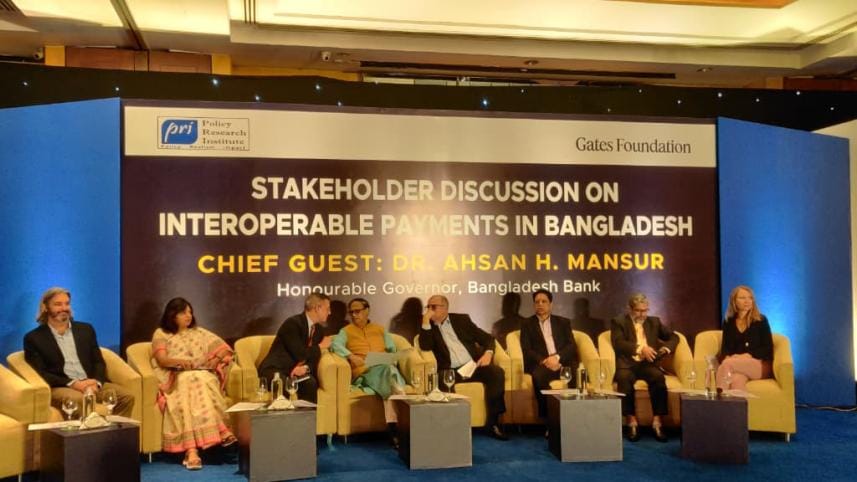Unified instant payment system in the offing: BB governor

The Bangladesh Bank (BB) will soon launch a unified instant payment system to curb the growing demand for cash, Governor Ahsan H Mansur said yesterday.
"The demand for cash has been rising at an annual rate of 10 percent, a trend that has persisted in recent years. To reverse this pattern and bring greater transparency to economic activities, the central bank is preparing to introduce a unified instant payment system," he said.
The BB governor made the remarks at a discussion titled "Stakeholder Discussion on Interoperable Payment in Bangladesh," organised by the Policy Research Institute with support from the Gates Foundation in Dhaka.
All financial institutions, including banks, mobile financial service (MFS) providers, microfinance institutions, and digital banks, will be linked to this single platform, he added.
The increasing demand for cash has also pushed up costs for banks. The banking sector now spends around Tk 20,000 crore annually on cash handling, according to the governor.
Mansur said the government is losing an estimated Tk 1.53 lakh crore in revenue due to the rising reliance on cash.
He noted that the process of introducing digital banks in Bangladesh is underway. At the same time, support from the Gates Foundation is being utilised to launch an interoperable instant payment system.
He also said authorities intend to implement an effective system by drawing on proven international experience, unlike the Binimoy project, which was suspended amid reports of irregularities, low response rates, and implementation problems.
The central bank governor stated that Bangladesh has made significant progress in financial inclusion.
"Around 64 percent of the country's population is now under the financial sector, although 35 to 40 percent still remain outside. It is not enough to only expand coverage; rather, the rural population must be deeply integrated into the financial sector," he said.
The BB has already made it mandatory for all licensed businesses to display QR codes at their shops, adding that people will be encouraged to use digital payments directly instead of withdrawing cash.
"Our goal is to reduce cash usage at both ends, and we want to promote digital QR payments in shops, restaurants, and marketplaces," said Mansur.
Delivering the keynote address at the discussion, Arief Hossain Khan, executive director of the payment systems department of BB, said three major players—banks, MFS providers, and microfinance institutions—play a key role in financial inclusion.
Khan said a robust, government-backed, unified platform with a simplified user experience is vital for an interoperable payment system.
Jason Lamb, deputy director of the Gates Foundation, and Snigdha Ali, Bangladesh country lead of the interoperable payment system of the Gates Foundation, also spoke at the discussion.
In the second session of the programme, panellists discussed the opportunities, challenges, and priorities for inclusive instant payment systems (IIPS) in Bangladesh.
In the panel discussion, Mohammad Muslim Chowdhury, chairman of Sonali Bank; Major General Sheikh Md Monirul Islam, chief external and corporate affairs officer of bKash; Shah Zia Ul Haque, additional director of the Bangladesh Bank; and others spoke.



 For all latest news, follow The Daily Star's Google News channel.
For all latest news, follow The Daily Star's Google News channel. 
Comments